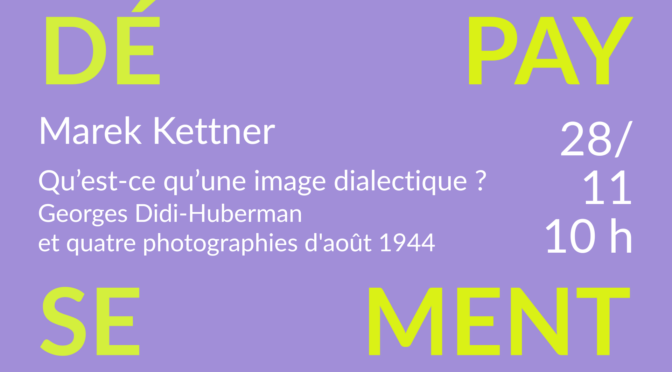
Georges Didi-Huberman and four photographs from August 1944
Second session of the 2025-2026 CEFRES Francophone
Interdisciplinary Seminar “Dépaysements”: Clues and Trajectories.
In 2023 we started questionning the very act of bordering and representing (a territory, a period, a trajectory). In short, thanks to the interdisciplinarity of our respective disciplines, we began inquiring into the question of the map and the border.
Location: CEFRES, Na Florenci 3, Prague 1
Date: Friday November 28, 2025, from 10 am
Language: French
Speaker: Marek KETTNER (University of Pilsen)
Discussant: Fedora PARKMANN (Institute of Art History of the Czech Academy of Sciences / associated at CEFRES)
Abstract
Georges Didi-Huberman conceived of imagination as a montage of images creating complex dialectical images. In his book Images malgré tout (Images Despite Everything), he explores the history of four exceptional photographs of Auschwitz. At the time of writing, these visual traces of the Holocaust are opening up to new interpretations, thanks to new testimonies and archival discoveries, in which imagination plays an essential role. According to the author, there is no historical knowledge without imagination. But imagination alone cannot function without visual traces, understood here as singular moments in a temporal process which cannot be recovered. While it is not possible to reconstruct historical events, it is nevertheless possible to construct dialectical images, montages of individual visual traces that present a given event in a new, often surprising light. With his concept of the dialectical image, Didi-Huberman follows in the footsteps of Walter Benjamin, although differs from him on essential points, as is perhaps best illustrated in his book Images malgré tout.
See the complete program of the 2025-2026 seminar here.
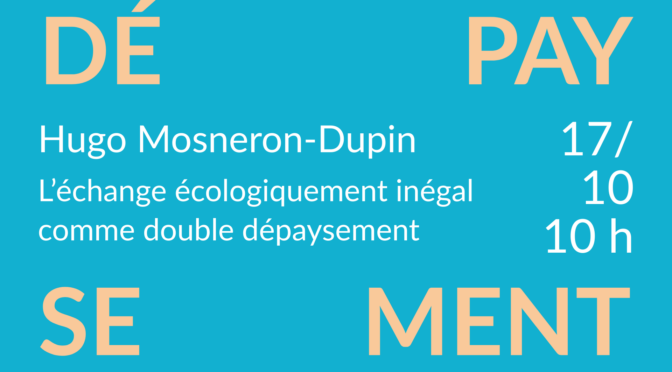
First session of the 2025-2026 CEFRES Francophone
Interdisciplinary Seminar “Dépaysements”: Clues and Trajectories.
In 2023 we started questionning the very act of bordering and representing (a territory, a period, a trajectory). In short, thanks to the interdisciplinarity of our respective disciplines, we began inquiring into the question of the map and the border.
Location: CEFRES, Na Florenci 3, Prague 1
Date: Friday October 17, 2025, from 10 am
Language: French
Speaker: Hugo MOSNERON-DUPIN (Doctor candidate in Economic Philosophy at the ENS – PSL & the CIRED)
Discussant: Jan MARŠÁLEK (FLÚ AVČR)
Abstract
The concept of ecologically unequal exchange seeks to substantiate critical theories of development by highlighting the environmental and territorial consequences of wealth inequalities between countries. To theories of unequal exchange that attempt to explain why certain economies are stuck in a model of exporting low value-added goods, they add a physical rather than economic assessment of these international exchanges: the most developed countries drain the natural resources, particularly energy resources, of the least developed countries, while capturing a portion of these territories and dedicating it to the export economy. Hence the notion of ecologically unequal exchange allows us to examine dépaysement in two ways: firstly, exporting constitutes a literal displacement, a transfer beyond the borders of an entity that carries with it a dimension – in this case, an ecological one – of its country of origin; secondly, the transformation of a territory to produce goods that will be sold abroad can be considered as a displacement not only of goods but of the producing territory itself. Indeed, the theory of ecologically unequal exchange shows that these territories can be considered as ecological enclaves of the importing country within the exporting country. We will conduct these reflections based on a comparative reading of Underdeveloping the Amazon (Stephen Bunker, 1987) – the seminal work on this approach – and a concrete study of ecologically unequal exchange on intensive shrimp farming in Ecuador by ecologist Howard Odum (1991).
See the complete program of the 2025-2026 seminar here.
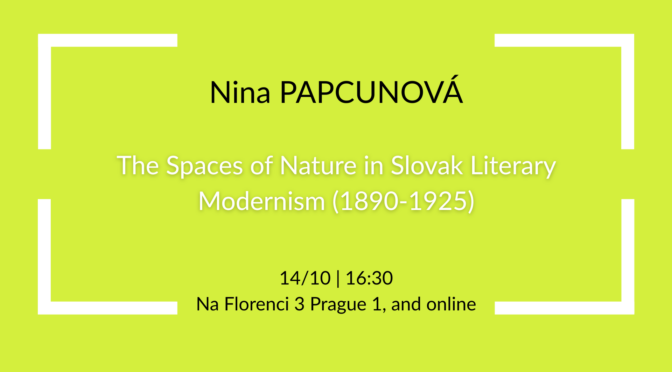
2nd session of CEFRES in-house seminar
Through the presentation of works in progress, CEFRES’s Seminar aims at raising and discussing issues about methods, approaches or concepts, in a multidisciplinary spirit, allowing everyone to confront her or his own perspectives with the research presented.
Location: CEFRES Library and online (to get the link, write to cefres[@]cefres.cz)
Date: Tuesday, October 14, 2025 at 4:30 pm
Language: English
Speaker: Nina PAPCUNOVÁ (CEFRES / SAS)
Discussant: Eva KRÁSOVÁ (CEFRES / Charles University)
Abstract Continue reading The Spaces of Nature in Slovak Literary Modernism (1890-1925) →
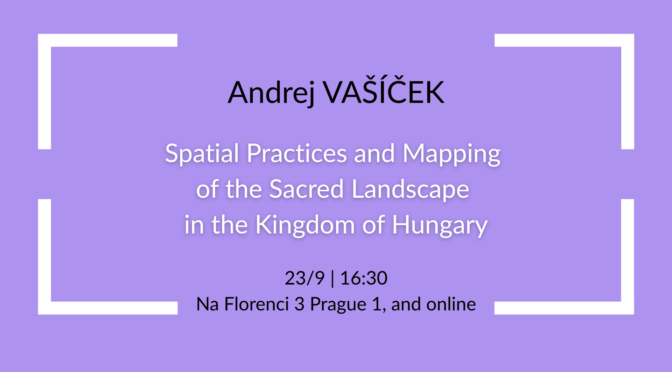
1st session of CEFRES in-house seminar
Through the presentation of works in progress, CEFRES’s Seminar aims at raising and discussing issues about methods, approaches or concepts, in a multidisciplinary spirit, allowing everyone to confront her or his own perspectives with the research presented.
Location: CEFRES Library and online (to get the link, write to cefres[@]cefres.cz)
Date: Tuesday, September 23, 2025 at 4:30 pm
Language: English
Speaker: Andrej VAŠÍČEK (CEFRES / FiF UK)
Discussant: Markéta ŠANTRŮČKOVÁ (Department of Cultural Landscape and Sites, Research Institute for Landscape and Ornamental Gardening – VUKOZ v.v.i)
Abstract
The lecture approaches the sacred landscape as a dynamic network of places and routes shaped by Baroque piety, diocesan reorganization and everyday practice. It combines historical geography with GIS to reconstruct how churches, chapels, Calvaries, crosses and cemeteries formed spatial hierarchies and itineraries. Cartographic sources are treated interpretively and cross-checked against canonical visitations, schematisms, municipal and parish records, epigraphy and field observation. A micro-case from the town of Púchov demonstrates hydrological and transport thresholds, the relocation of burial grounds extra muros and the dating power of chronograms. The talk proposes a transferable workflow for the historical-geographical reconstruction of sacred layers in Central Europe and reflects on practical uses in heritage management, spatial planning and public engagement.
Please find the complete program of 2025–2026 seminar here.
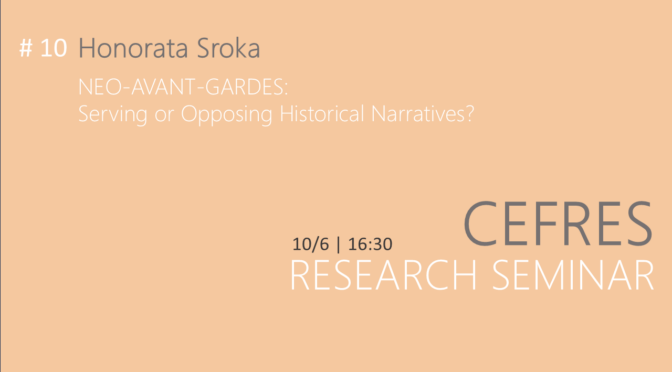
10th session of CEFRES in-house seminar
Through the presentation of works in progress, CEFRES’s Seminar aims at raising and discussing issues about methods, approaches or concepts, in a multidisciplinary spirit, allowing everyone to confront her or his own perspectives with the research presented.
Location: CEFRES Library and online (to get the link, write to cefres[@]cefres.cz)
Date: Tuesday, June 10, 2025 at 4:30 pm
Language: English
Speaker: Honorata Sroka (CEFRES / Charles University)
Chair: Hélène Martinelli (CEFRES / École Normale Supérieure de Lyon)
Text to be read: Peter Bürger (1974). Theory of the Avant-Garde. Translation Michael Shaw. Manchester: Manchester University Press.
Abstract
The presentation will take the form of very preliminary remarks related to my post-doctoral research, which I have been conducting for 7 months at the French Research Centre for Humanities and Social Sciences. My project develops the same line of research as my doctoral thesis, however, approaches the issue in a broader way. Specifically, using selected examples of neo-avant-gardes in Central and Eastern Europe, I hope to show how and why artists decided to create subversive forms of historiography and what kind of experimental strategies can be found in archives. Employing the methodology so-called “cultural history of the avant-gardes”, I will reflect on vanguard institutions and practices oriented towards a self-historiography. What I dare to claim one can essentially call a discussion on Peter Bürger’s pivotal book Theory of the Avant-Garde (1974). He was the one who argued that the avant-gardes stood against institutions. In contrast to his assumption, my research aims to display how neo-avant-gardes in Central and Eastern Europe developed rather than destroyed art institutions, as well as subversive forms of historiography, and why these two were intertwined.
Please find the complete program of 2024–2025 seminar here.
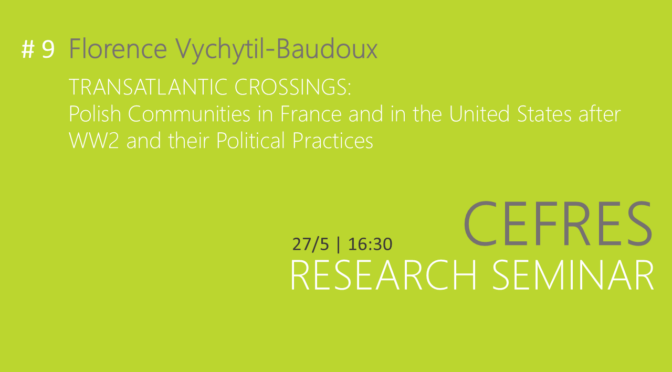
Polish Communities in France and in the United States after WW2 and their Political Practices
9th session of CEFRES in-house seminar
Through the presentation of works in progress, CEFRES’s Seminar aims at raising and discussing issues about methods, approaches or concepts, in a multidisciplinary spirit, allowing everyone to confront her or his own perspectives with the research presented.
Location: CEFRES Library and online (to get the link, write to cefres[@]cefres.cz)
Date: Tuesday, May 27, 2025 at 4:30 pm
Language: English
Speaker: Florence Vychytil-Baudoux (EHESS / CEFRES)
Chair: Françoise MAYER
Text to be read: Michael Werner & Bénédicte Zimmermann, « Beyond Comparison: Histoire Croisée and the Challenge of Reflexivity », History and Theory, 2006, vol. 45, no 1, p. 30‑50.
Abstract:
Between the 1880s and the 1930s, over 12 million people left Polish territories “za chlebem” (for bread). While before WW1 the United States attracted most Polish peasants looking for a better future, it was France that became the main destination for Polish migrants in the interwar period. Continue reading Transatlantic Crossings | CANCELLED →






